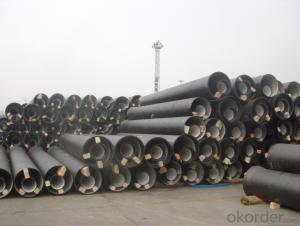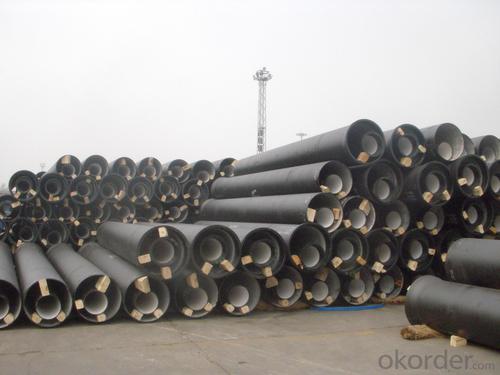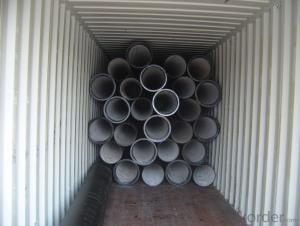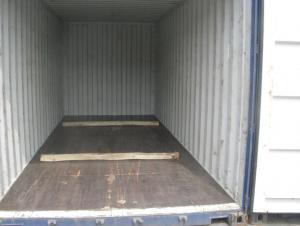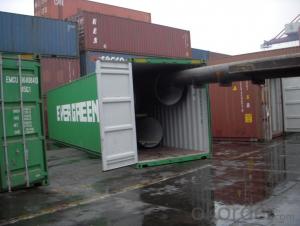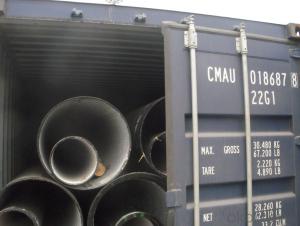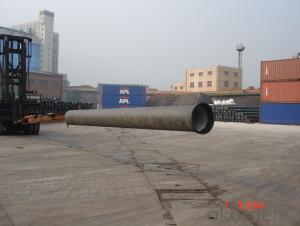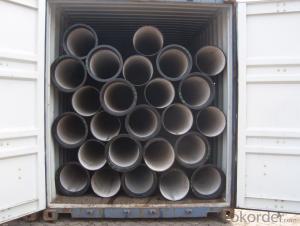DUCTILE IRON PIPES AND PIPE FITTINGS k8 CLASS DN1400
- Loading Port:
- Tianjin
- Payment Terms:
- TT OR LC
- Min Order Qty:
- 22 pc
- Supply Capability:
- 3000 pc/month
OKorder Service Pledge
OKorder Financial Service
You Might Also Like
Material : Ductile Cast Iron
Size Range : DN 80mm to DN 2000mm
Unit Effective Length : 6m or 5.7m
Manufacture Standard: ISO 2531:1998/ EN 545:2006/EN 598:2007
Annual capacity : 200,000 tons
Coating Exterior: Zinc 130g/m2 according to ISO 8179-1 and bitumen coating 70 microns.
Cement Interior: Portland Cement/ High Alumina Cement/ Sulphate Resisting Cement Lining according to ISO 4179
Special requirements on external coating and internal lining can be applied
We also provide accessories such as SBR/EPDM rubber gaskets, lubricant paste, pipe caps, PE sleeves, etc.
Additional Parts:
Each pipe is strictly inspected according to related standard to ensure permanently high performance.
Easy Installation at site and service free for life
Long Service Lifespan
Quotation will arrive you within 24hours once we get your inquiry.
We guarantee offering you a competitive price.
A copy of original inspection reports of pipes will be offered after shipment.
Photos of loading process will be sent to the customer after shipment effect.
We will follow-up the delivery progress after shipment effect and update to the customer on weekly basis.
- Q: How are ductile iron pipes protected against external corrosion?
- Ductile iron pipes are protected against external corrosion through a combination of manufacturing processes and external coatings. The first line of defense is the inherent corrosion resistance of ductile iron itself. The iron is treated with a special alloying element, typically magnesium, which forms a protective layer on the surface of the pipe. This layer acts as a barrier against corrosion and helps to extend the lifespan of the pipe. In addition to the corrosion-resistant properties of the iron, ductile iron pipes are also externally coated with protective materials. One common method is to apply a layer of asphaltic or bituminous coating to the pipe's surface. This coating acts as a barrier against moisture and corrosive substances in the soil, preventing them from coming into contact with the iron. It also provides a layer of insulation, reducing the likelihood of galvanic corrosion. Another method of external corrosion protection is the use of fusion-bonded epoxy (FBE) coatings. FBE is a thermosetting resin that is applied to the surface of the pipe and then heat-cured to form a strong and durable coating. This coating provides excellent resistance against corrosion, abrasion, and impact, making it a popular choice for ductile iron pipes in harsh environments. In some cases, additional protective measures such as cathodic protection systems may be employed. These systems use electric currents to counteract the corrosion process by supplying electrons to the pipe's surface. This helps to prevent corrosion from occurring, especially in areas where the coating may have been damaged or compromised. Regular maintenance and inspection are also crucial in ensuring the long-term protection of ductile iron pipes against external corrosion. This includes periodic cleaning, repair of any coating damages, and monitoring the integrity of the protective layers. Overall, the combination of the inherent corrosion resistance of ductile iron, external coatings, and maintenance practices ensures that ductile iron pipes are well-protected against external corrosion, allowing them to have a longer lifespan and deliver reliable performance in various applications.
- Q: Can ductile iron pipes be used for oil and gas pipelines?
- Yes, ductile iron pipes can be used for oil and gas pipelines. Ductile iron is a strong and durable material that is resistant to corrosion, making it suitable for transporting oil and gas over long distances. Additionally, ductile iron pipes have excellent pressure-bearing capabilities, making them capable of withstanding the high pressures often associated with oil and gas transportation. Furthermore, ductile iron pipes are relatively easy to install and maintain, which adds to their suitability for oil and gas pipelines. However, it is important to note that the specific application and conditions of the pipeline must be considered, and consulting with industry experts is recommended to ensure the proper selection and installation of ductile iron pipes for oil and gas transportation.
- Q: Are ductile iron pipes resistant to abrasion?
- Yes, ductile iron pipes are resistant to abrasion. Ductile iron is a type of cast iron that has been treated with magnesium to improve its strength and ductility. This makes it highly resistant to wear and tear, including abrasion. Ductile iron pipes are commonly used in applications where they may come into contact with abrasive materials such as sand, gravel, or other particles in the flow. The material's ability to withstand abrasion helps ensure its long-term durability and reliability in various industries, including water distribution, sewer systems, and industrial pipelines.
- Q: What are the different methods for testing ductile iron pipe?
- There are several methods available for testing ductile iron pipe to ensure its quality and reliability. These methods include: 1. Hydrostatic Testing: This is the most common method used for testing ductile iron pipe. It involves filling the pipe with water and pressurizing it to a specified level. The pipe is then inspected for any leaks or deformations under the applied pressure. Hydrostatic testing helps determine the pipe's ability to withstand internal pressure without failure. 2. Tensile Testing: This method involves subjecting a sample of the ductile iron pipe to a gradually increasing tensile load until it fractures. The test measures the ultimate tensile strength, yield strength, and elongation of the material. Tensile testing helps evaluate the pipe's mechanical properties and its ability to withstand tension without breaking. 3. Hardness Testing: This method measures the hardness of the ductile iron pipe using various techniques such as Brinell, Rockwell, or Vickers hardness tests. Hardness testing provides information about the material's resistance to deformation, wear, and fatigue. It helps assess the pipe's durability and resistance to external forces. 4. Impact Testing: This method involves striking a notched sample of the ductile iron pipe with a pendulum or falling weight to measure its impact resistance. The test determines the material's ability to absorb energy during sudden loading or impact. Impact testing helps evaluate the pipe's ability to withstand accidental impacts or dynamic loads. 5. Ultrasonic Testing: This non-destructive testing method uses high-frequency sound waves to detect internal defects or discontinuities in the ductile iron pipe. Ultrasonic testing can identify voids, cracks, or inclusions that may affect the pipe's structural integrity. It helps ensure the pipe's soundness and reliability. 6. Magnetic Particle Testing: This method is primarily used for detecting surface or near-surface defects in the ductile iron pipe. It involves applying a magnetic field to the pipe and then applying magnetic particles to the surface. Any defects present will cause the magnetic particles to gather and form visible indications. Magnetic particle testing helps identify surface cracks, laps, or other defects that may affect the pipe's performance. These different testing methods help ensure that ductile iron pipe meets industry standards and specifications, ensuring its quality and reliability in various applications.
- Q: What is the average diameter range of ductile iron pipes?
- The average diameter range of ductile iron pipes can vary depending on the specific application and industry standards. However, in general, ductile iron pipes are available in a wide range of diameters to meet various requirements. Commonly, the average diameter range for ductile iron pipes can start from as small as 4 inches (100 mm) and go up to 64 inches (1600 mm) or even larger. These sizes are often used for water distribution, sewer systems, and other infrastructure projects. It is important to note that the specific diameter range of ductile iron pipes can be influenced by factors such as local regulations, project specifications, and engineering considerations. Therefore, it is recommended to consult industry standards and relevant authorities to determine the appropriate diameter range for a specific application.
- Q: What are the typical joint restraint requirements for ductile iron pipes in seismic zones?
- In seismic zones, the typical joint restraint requirements for ductile iron pipes are designed to ensure the structural integrity and prevent displacement or separation of the pipes during seismic events. These requirements are crucial to maintain the reliability and functionality of the pipeline system. One common joint restraint requirement for ductile iron pipes in seismic zones is the use of flexible or mechanical joint systems. Flexible joints, such as rubber gasket joints, can absorb and accommodate the movement caused by seismic activity. These joints allow for axial movement, angular deflection, and expansion/contraction of the pipes, reducing the risk of pipe failure or damage. Another important requirement is the use of adequate anchoring systems. This involves securing the pipes to the surrounding structures or embedding them in concrete thrust blocks to prevent excessive movement or displacement during seismic events. Anchoring systems help distribute the forces generated by the earthquake and minimize the risk of pipe separation or breaking. Additionally, seismic design standards often require the use of seismic restraints, such as seismic joint restraints or bracing systems, to further enhance the stability and integrity of the ductile iron pipes. These restraints are designed to limit the movement of the pipes in specific directions, reducing the potential for damage and maintaining the overall system performance. It is important to note that the specific joint restraint requirements for ductile iron pipes in seismic zones may vary depending on local building codes, seismic activity levels, and engineering considerations. It is crucial to consult the relevant regulations and work with experienced professionals in the design and installation process to ensure compliance with the necessary requirements for seismic resistance.
- Q: Can ductile iron pipe be used for hydropower systems?
- Yes, ductile iron pipe can be used for hydropower systems. Ductile iron pipe is known for its strength, durability, and corrosion resistance, which makes it an ideal choice for various applications, including hydropower systems. The high tensile strength of ductile iron allows it to withstand the high pressure and load requirements of such systems. Additionally, its corrosion resistance properties make it suitable for use in water environments, ensuring a long lifespan and minimal maintenance needs. Therefore, ductile iron pipe can be effectively utilized for hydropower systems, providing a reliable and efficient solution for transporting water and supporting the infrastructure of the system.
- Q: How do ductile iron pipes handle concentrated loads?
- Ductile iron pipes are highly resistant to concentrated loads due to their inherent strength and flexibility. They have the ability to distribute the load over a larger area, minimizing the risk of failure or damage. This makes them suitable for handling heavy loads and ensuring long-term durability in various applications.
- Q: Can ductile iron pipes be used for underground fire protection systems?
- Ductile iron pipes are indeed applicable for underground fire protection systems. Their exceptional strength and durability render them suitable for enduring the intense pressure and high temperatures that may arise during a fire. Moreover, these pipes exhibit significant resistance to corrosion, a vital attribute for long-term underground usage. In addition, they possess exceptional flow characteristics, enabling swift and efficient water delivery for extinguishing fires. All in all, ductile iron pipes prove to be a dependable and efficient selection for underground fire protection systems.
- Q: Can ductile iron pipes be used for irrigation systems in agricultural fields?
- Ductile iron pipes are indeed suitable for use in agricultural fields for irrigation systems. Their durability, strength, and corrosion resistance are well-known, making them an excellent choice for a variety of applications, including irrigation systems. These pipes can withstand high pressures and effectively transport water for irrigation purposes. Moreover, the ductile iron material is resistant to various environmental factors like UV rays, soil chemicals, and temperature changes, ensuring that the pipes have a long lifespan. Additionally, ductile iron pipes exhibit excellent flow characteristics, enabling efficient water distribution across the agricultural fields. In summary, ductile iron pipes offer a reliable and sturdy option for irrigation systems in agricultural fields, delivering a sustainable and efficient solution for water distribution.
Send your message to us
DUCTILE IRON PIPES AND PIPE FITTINGS k8 CLASS DN1400
- Loading Port:
- Tianjin
- Payment Terms:
- TT OR LC
- Min Order Qty:
- 22 pc
- Supply Capability:
- 3000 pc/month
OKorder Service Pledge
OKorder Financial Service
Similar products
Hot products
Hot Searches
Related keywords
